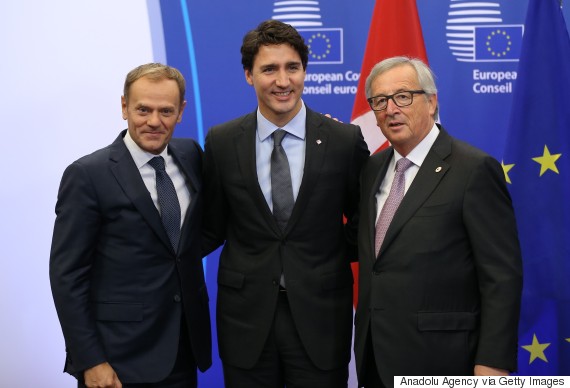Juli Brauer
J.D. Candidate, Columbia Law School, 2017
“If ever European solidarity needed to manifest itself, it is on the question of the refugee crisis. It is time to show collective courage and deliver this European response now.”[1]
—Jean Paul Juncker, President of the European Commission
Europe is currently in the process of implementing a new deal for EU-wide relocation of the refugees who have arrived in Italy and Greece in droves seeking asylum, primarily from a civil war in Syria. First proposed by the European Commission in Strasbourg on September 9, 2015, the plan aims to ease the burden weighing on the most heavily affected frontline member states—in particular Greece and Italy. Initial proposals also included Hungary as a frontline country in need of relief from the strains of thousands of refugees flooding in, but Hungary objected, so many of its refugees will be sent to Greece and Italy for processing and resettlement. By the plan’s terms, refugees will be screened and fingerprinted in a frontline country, then relocated to another EU member state, which will receive €6,000 per refugee. Three Eastern European countries—Hungary, Slovakia, and Romania—voted against the proposal but were overruled, while Finland abstained.[2]
The proposal was crystallized and voted on towards the end of September, with a final figure of 120,000 refugees to be relocated, on top of the 40,000 already relocated in May, 2015. Broken down, those refugees will be moved from Hungary (54,000), Greece (50,400), and Italy (15,600).[3] It is not yet entirely clear how the EU plans to select which refugees will be chosen for resettlement, but the Commission has announced that only refugees from Syria, Iraq, and Eritrea will qualify, and that vulnerable groups, including unaccompanied children and rape victims, will get priority.[4] The Commission will also consider the refugees’ language skills and the presence of any family members in Europe in deciding the countries to which they should be sent.[5] Initially, the proposal included a mandatory distribution key that would require each EU member state to take in a certain number of refugees, to be determined by several indices—among them, the state’s GDP, its total number of asylum applicants, and its unemployment rate—but these quotas were dropped from the final agreement.[6] The plan calls for completion of the resettlements within two years.
Some hailed the finalization of the resettlement deal as a profound symbol of European unity and cooperative action. Italian Interior Minister Angelino Alfano said, “Today is an important day for the European Union, it is a day of victory . . . for those who believe in Europe . . .”[7] This optimism is not wholly unfounded: the plan represents the Union coming to the aid of those of its member states on the frontline, and recognizing that this burden ought to be shared among all 28 member states. But the symbolism of this deal for the unity of EU member states should not be overstated. Opt-outs to the plan; local backlash; the burgeoning of nationalist, populist parties; and vocal dissents to the plan are all reminders that the EU is a fragile union.
Three member states—the U.K., Ireland, and Denmark—have all opted out of Juncker’s plan. Their right to do so is treaty-based: Article 78(3) TFEU grants the Commission the power to respond to any emergency situation by adopting measures like this resettlement plan, but since its inception, member states have negotiated opt-outs of certain provisions of the TFEU. While such opt-outs are rare (arranged by only four member states—the U.K., Ireland, Denmark, and Poland), they include the provisions containing Article 78(3) and thus allow these countries to refuse to participate in Juncker’s plan. The U.K., Ireland, and Denmark have all opted out, though Denmark has privately agreed to voluntarily take in 1,000 refugees and Ireland has similarly agreed to take in 4,000. (These numbers are much lower than they would have been were Denmark and Ireland to take their share of the 120,000 refugees covered by the Commission’s plan.) Britain has refused to accept refugees from the overburdened frontline countries in Europe, instead electing to take over 20,000 people in the next five years from camps and shelters in the Middle East.[8] While this parallel plan disincentivizes refugees from making the dangerous voyage across the Mediterranean, it has also been criticized as an abdication by Britain of its responsibility to its co-member states in the EU at a time when there is a desperate need for solidarity.[9]
These opt-outs are not the only indication that Europe is not fully unified around the resettlement plan. Frontline countries remain aggrieved, arguing that Western Europe has not shouldered its share of the burden. Turkey’s Prime Minister made a statement that the west’s response made the concept of burden-sharing “meaningless,” and countries like Serbia, Macedonia, Greece, Italy, and Turkey (all checkpoints for refugees hoping to move northward and westward), desperately need institutional assistance and funding to process all of the migrants coming through.[10] Moreover, given that several countries had dissented to the passage of the plan, bitter European countries will be forced to cooperate with the Commission’s decision that they find objectionable.[11]
Divisions in the EU and an unshared commitment to common EU goals are evident in yet other ways. Hungary has erected a fence on its border with Serbia in an effort to cut off the flow of migrants. The EU has launched over 40 infringement cases against 19 member states for failing to implement asylum rules (for example, ensuring humane treatment of asylum seekers and clarifying the grounds for granting asylum).[12] Significantly, strong differences in the outlooks of Southern and Eastern Europe have paralyzed Europe strategically in the last few years. Eastern Europe has, as its main concern, the increasingly aggressive mammoth to its right—Putin-led Russia—while Southern Europe is more focused on the conflicts in nearby northern Africa and the Middle East. With different focal points orienting their policies, these two regions of Europe have trouble seeing eye to eye and coming to agreements on pressing issues like the refugee crisis.[13]
All things considered, the EU’s resettlement plan is only a baby step in the right direction, and the European solidarity it expresses seems half-hearted. The proposed resettlement of 160,000 total refugees represents less than 4% of the more than four million displaced in countries neighboring Syria, and does not not do enough to ease the massive burden crushing frontline countries like Greece, Italy, and Turkey. More can, and should, be done. As Chancellor Angela Merkel, perhaps the greatest leader on the European side of the refugee crisis, has said, helping the refugees is a humanitarian duty, and member states signed up to abide by strong human rights standards by joining the EU.[14]
[1] European Commission Press Release IP/15/5596, Refugee Crisis: European Commission Takes Decisive Action (Sept. 9, 2015).
[2] BBC News, Migrant Crisis: Why EU Deal on Refugees is Difficult, BBC News (Sept. 25, 2015), http://www.bbc.com/news/world-europe-34324096.
[3] Id.
[4] Id.
[5] Id.
[6] Id.
[7] Sneha Shankar, EU Refugee Crisis: First Group of Asylum-Seekers Leave Italy for Sweden Under Resettlement Plan, Int’l Bus. Times (Oct. 9, 2015), http://www.ibtimes.com/eu-refugee-crisis-first-group-asylum-seekers-leave-italy-sweden-under-resettlement-2134565.
[8] Matthew Weaver, Refugee Crisis: EU Summit Amid Resentment Over Quota Deal—As It Happened, The Guardian, http://www.theguardian.com/world/live/2015/sep/23/refugee-crisis-eu-summit-amid-resentment-over-quota-deal-live-updates (last updated Sept. 23, 2015).
[9] Griff Witte, As Europe Fills With Refugees, Britain Goes Its Own Way, Wash. Post (Oct. 3, 2015), https://www.washingtonpost.com/world/europe/as-europe-fills-with-refugees-britain-goes-its-own-way/2015/10/01/c6793afe-6305-11e5-8475-781cc9851652_story.html.
[10] Matthew Weaver, Refugee Crisis: Juncker Unveils EU Quota Plan—As It Happened, The Guardian, http://www.theguardian.com/world/live/2015/sep/09/refugee-crisis-junker-unveils-eu-quota-plan-live-updates (last updated Sept. 9, 2015).
[11] Michael Birnbaum, EU Votes to Distribute 120,000 Asylum Seekers Across Europe, Wash. Post (Sept. 22, 2015), https://www.washingtonpost.com/world/europe/eu-ministers-seek-common-front-on-refugee-crisis/2015/09/22/34ad5a66-60a2-11e5-8475-781cc9851652_story.html.
[12] Weaver, supra note 8.
[13] Panel hosted by Columbia School of International Affairs, Refugees and Migrants on the Move: The Moment of Truth for the EU and the Middle East? (Oct. 7, 2015).
[14] BBC News, supra note 2.




